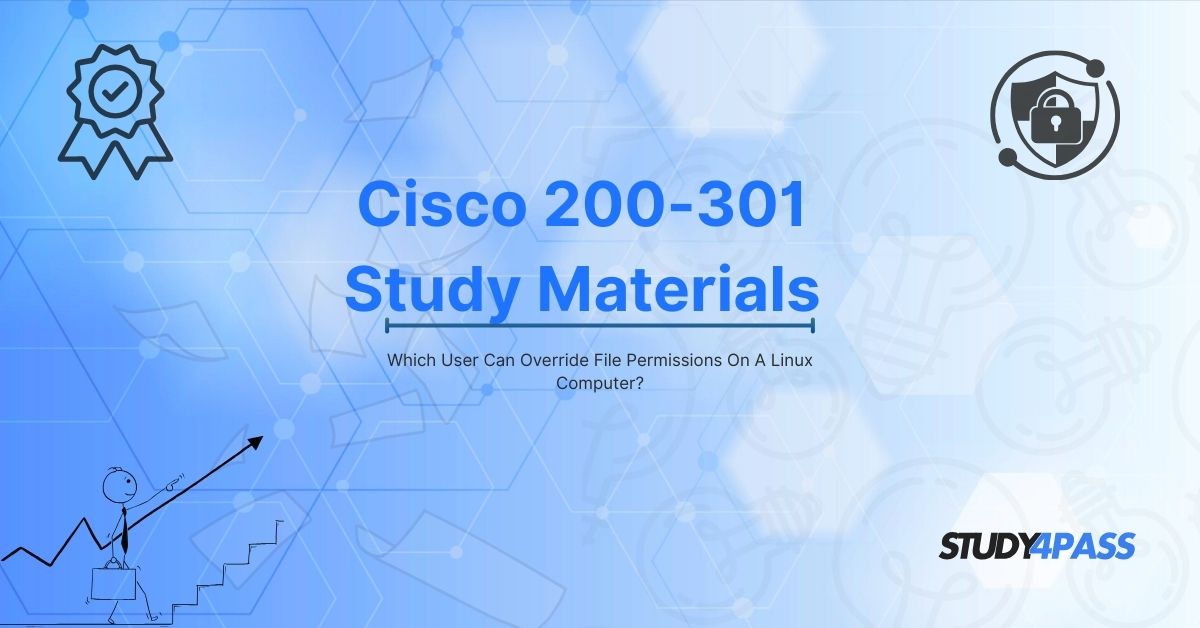Introduction to Linux File Permissions - CCNA Cyber Ops (v1.1)
Linux file permissions are a fundamental aspect of system security, ensuring that only authorized users can access, modify, or execute files and directories. However, certain users can override these permissions, which is a critical concept for cybersecurity professionals preparing for the CCNA Cyber Ops (v1.1) and CCNA 200-301 exams.
This article explores:
- Linux file permissions and ownership
- Which users can override file permissions
- Security implications for cybersecurity professionals
- How Study4Pass aids in mastering these concepts for certification exams
By the end of this guide, you will have a deep understanding of Linux file permissions and how they apply to real-world cybersecurity scenarios.
Linux File Permissions Overview
Linux uses a permission system to regulate access to files and directories. Permissions are assigned to three entities:
- Owner (User) – The user who created the file.
- Group – A set of users with shared permissions.
- Others – All other users on the system.
Each file has three types of permissions:
- Read (r) – Allows viewing file contents.
- Write (w) – Allows modifying or deleting the file.
- Execute (x) – Allows running the file as a program.
Permissions are displayed in symbolic (e.g., rwxr-xr--) or numeric (e.g., 755) format.
Users Who Can Override File Permissions
While standard users must adhere to file permissions, certain privileged users can bypass these restrictions:
A. The Root User (Superuser)
- The root user (UID 0) has unrestricted access to all files and directories.
- Can read, modify, or delete any file, regardless of permissions.
- Example commands:
sudo chmod 777 /path/to/file # Changes permissions
sudo chown root:root /path/to/file # Changes ownership
B. Users with Sudo Privileges
- Users added to the sudoers file (/etc/sudoers) can execute commands as root.
- Can override permissions using sudo.
- Example:
sudo cat /etc/shadow # Accesses a restricted file
C. Users Assigned Specific Capabilities (CAP_DAC_OVERRIDE)
- Linux capabilities allow granular privilege assignment.
- The CAP_DAC_OVERRIDE capability bypasses file permission checks.
- Example:
setcap cap_dac_override+ep /usr/bin/customscript
D. Processes Running with Setuid (SUID) Bit
- If a file has the SUID bit set (chmod u+s), it runs with the owner’s privileges.
- Example:
chmod u+s /usr/bin/passwd # Allows users to modify /etc/shadow
Security Risks and Mitigation
A. Risks of Permission Overrides
- Privilege Escalation: Attackers exploit misconfigured permissions to gain root access.
- Unauthorized Data Access: Sensitive files (e.g., /etc/passwd) can be exposed.
- Malicious Script Execution: SUID binaries can be hijacked.
B. Best Practices for Securing Linux Systems
- Principle of Least Privilege: Grant minimal necessary permissions.
- Audit Sudoers File: Regularly review /etc/sudoers.
- Disable Unnecessary SUID Binaries:
find / -perm -4000 -exec ls -ld {} \; # Lists all SUID files
- Use Linux Security Modules (LSM): Implement SELinux or AppArmor.
Relevance to CCNA Cyber Ops (v1.1) and 200-301 Exams
Understanding Linux permissions is crucial for:
- Incident Response: Detecting unauthorized permission changes.
- Vulnerability Assessment: Identifying insecure file permissions.
- System Hardening: Applying security best practices.
The CCNA Cyber Ops and 200-301 exams test these concepts in scenarios involving:
- File integrity monitoring
- Privilege escalation attacks
- Security compliance checks
How Study4Pass Helps You Master These Concepts?
Preparing for Cisco certifications requires high-quality study materials. Study4Pass provides:
- Comprehensive CCNA Cyber Ops (v1.1) Study Guides – Detailed explanations of Linux security.
- 200-301 Exam Practice Questions – Real-world scenarios on file permissions.
- Hands-on Labs – Simulated Linux environments for practice.
- Up-to-Date Content – Aligned with the latest exam objectives.
By using Study4Pass, you gain:
- Structured Learning Paths – Covers all exam topics systematically.
- Expert-Curated Material – Developed by cybersecurity professionals.
- Exam Simulation Tools – Mimics real test conditions.
For aspiring cybersecurity professionals, Study4Pass is the ultimate resource for mastering Linux security and acing Cisco exams.
Final Words
Linux file permissions are a critical security mechanism, but privileged users like root, sudoers, and processes with CAP_DAC_OVERRIDE or SUID can override them. Understanding these concepts is essential for the CCNA Cyber Ops (v1.1) and 200-301 exams.
By leveraging Study4Pass, you can deepen your knowledge, practice real-world scenarios, and achieve certification success. Start your journey today and dominate your cybersecurity career!
Special Discount: Offer Valid For Limited Time “Cisco 200-301 Exam Prep Practice Tests”
Sample Questions for Cisco 200-301 Materials
Actual exam question from Cisco's 200-301 Study Guide.
1. Which user in Linux has the ultimate authority to override file permissions?
a) Regular User
b) Guest User
c) Root User
d) Sudo User
2. What privilege allows the root user to bypass file permission restrictions?
a) Standard User Access
b) Superuser (Admin) Privileges
c) Guest Mode
d) Network User Rights
3. Which command can a user with sudo privileges use to override file permissions?
a) sudo cat
b) sudo chmod
c) sudo ls
d) sudo echo
4. In Linux, besides the root user, who else can override file permissions?
a) Any user in the "users" group
b) Users with sudo rights
c) Only the system administrator
d) Both b and c
5. What is the UID (User ID) of the root user in Linux?
a) 500
b) 1000
c) 0
d) 1


